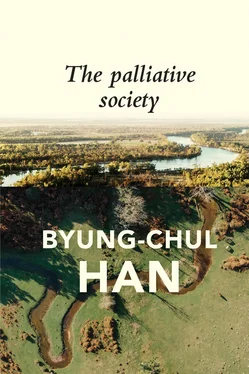1 Cover
2 Title Page The Palliative Society Pain Today Byung-Chul Han Translated by Daniel Steuer polity
3 Copyright Originally published in German as Palliativgesellschaft. Schmerz heute © MSB Matthes & Seitz Berlin Verlagsgesellschaft mbH, Berlin 2020. All rights reserved. This English edition © 2021 by Polity Press Polity Press 65 Bridge Street Cambridge CB2 1UR, UK Polity Press 101 Station Landing Suite 300 Medford, MA 02155, USA All rights reserved. Except for the quotation of short passages for the purpose of criticism and review, no part of this publication may be reproduced, stored in a retrieval system or transmitted, in any form or by any means, electronic, mechanical, photocopying, recording or otherwise, without the prior permission of the publisher. ISBN-13 978-1-5095-4725-8 A catalogue record for this book is available from the British Library. The publisher has used its best endeavours to ensure that the URLs for external websites referred to in this book are correct and active at the time of going to press. However, the publisher has no responsibility for the websites and can make no guarantee that a site will remain live or that the content is or will remain appropriate. Every effort has been made to trace all copyright holders, but if any have been overlooked the publisher will be pleased to include any necessary credits in any subsequent reprint or edition. For further information on Polity, visit our website: politybooks.com
4 Dedication Dedication Of all the corporeal feelings, pain alone is like a navigable river which never dries up and which leads man down to the sea. Pleasure, in contrast, turns out to be a dead end, wherever man tries to follow its lead. Walter Benjamin*
5 Algophobia Notes
6 The Compulsion of Happiness Notes
7 Survival Notes
8 The Meaninglessness of Pain Notes
9 The Cunning of Pain Notes
10 Pain as Truth Notes
11 The Poetics of Pain Notes
12 The Dialectic of Pain Notes
13 The Ontology of Pain Notes
14 The Ethics of Pain Notes
15 The Last Man Notes
16 Translator’s Notes (*)
17 End User License Agreement
1 Cover
2 Table of Contents
3 Title Page
4 Copyright
5 Dedication
6 Begin Reading
7 Translator’s Notes (*)
8 End User License Agreement
1 iii
2 iv
3 vi
4 1
5 2
6 3
7 4
8 5
9 6
10 7
11 8
12 9
13 10
14 11
15 12
16 13
17 14
18 15
19 16
20 17
21 18
22 19
23 20
24 21
25 22
26 23
27 24
28 25
29 26
30 27
31 28
32 29
33 30
34 31
35 32
36 33
37 34
38 35
39 36
40 37
41 38
42 39
43 40
44 41
45 42
46 43
47 44
48 45
49 46
50 47
51 48
52 49
53 50
54 51
55 52
56 53
57 54
58 55
59 56
60 57
61 58
62 59
63 60
64 69
65 70
66 71
67 72
The Palliative Society
Pain Today
Byung-Chul Han
Translated by Daniel Steuer
polity
Originally published in German as Palliativgesellschaft. Schmerz heute © MSB Matthes & Seitz Berlin Verlagsgesellschaft mbH, Berlin 2020. All rights reserved.
This English edition © 2021 by Polity Press
Polity Press
65 Bridge Street
Cambridge CB2 1UR, UK
Polity Press
101 Station Landing
Suite 300
Medford, MA 02155, USA
All rights reserved. Except for the quotation of short passages for the purpose of criticism and review, no part of this publication may be reproduced, stored in a retrieval system or transmitted, in any form or by any means, electronic, mechanical, photocopying, recording or otherwise, without the prior permission of the publisher.
ISBN-13 978-1-5095-4725-8
A catalogue record for this book is available from the British Library.
The publisher has used its best endeavours to ensure that the URLs for external websites referred to in this book are correct and active at the time of going to press. However, the publisher has no responsibility for the websites and can make no guarantee that a site will remain live or that the content is or will remain appropriate.
Every effort has been made to trace all copyright holders, but if any have been overlooked the publisher will be pleased to include any necessary credits in any subsequent reprint or edition.
For further information on Polity, visit our website: politybooks.com
Of all the corporeal feelings, pain alone is like a navigable river which never dries up and which leads man down to the sea. Pleasure, in contrast, turns out to be a dead end, wherever man tries to follow its lead.
Walter Benjamin*
Tell me your relation to pain, and I will tell you who you are! 1This line from Ernst Jünger can be applied to society as a whole. Our relation to pain reveals what kind of society we are. Pain is a cipher. It contains the key to understanding any society. Every critique of society must therefore provide a hermeneutics of pain. If pain is left to medicine, we neglect its character as a sign.
Today, a universal algophobia rules: a generalized fear of pain. The ability to tolerate pain is rapidly diminishing. The consequence of this algophobia is a permanent anaesthesia . All painful conditions are avoided. Even the pain of love is treated as suspect. This algophobia extends into society. Less and less space is given to conflicts and controversies that might prompt painful discussions. Algophobia also takes hold of politics. The pressure to conform and to reach consensus intensifies. Politics accommodates itself to the demands of this palliative zone and loses all vitality. ‘There is no alternative’: this is a political analgesia . The vague ‘centre ground’ has a palliative effect. Instead of argument and competition over the better ideas, there is a surrender to systemic compulsion. Post-democracy, palliative democracy , is spreading. This is why Chantal Mouffe demands an ‘agonistic politics’ that does not shy away from debate. 2Palliative politics is incapable of implementing radical reforms that might be painful. It prefers quick-acting analgesics, which only mask systemic dysfunctionality and distortion. Palliative politics lacks the courage to endure pain . So all we get is more of the same.
Today’s algophobia is based on a paradigm shift. We live in a society of positivity that tries to extinguish any form of negativity. Pain is negativity par excellence. This paradigm shift is also present in psychology, where there has been a movement away from a negative ‘psychology of suffering’ and towards a ‘positive psychology’ concerned with well-being, happiness and optimism. 3Negative thoughts are to be avoided. They should immediately be replaced with positive ones. Positive psychology subjects even pain to a logic of performance. For the neoliberal ideology of resilience, traumatic experiences should be seen as catalysts that increase performance. There is even talk of ‘post-traumatic growth’. 4The idea that we should build our resilience in order to increase our psychological strength has turned the human being into a permanently happy subject of performance, a subject as insensitive to pain as it is possible to be.
There is a relationship between the ‘Mission Happiness’ of positive psychology and the promise that one can live a life of permanent drug-induced well-being. The US opioid crisis is emblematic in this context. This crisis is not just a matter of the greed of pharmaceutical companies. Rather, its foundation is a fateful assumption regarding human existence. Only an ideology of permanent well-being could have brought it about that a medication originally for use in palliative medicine could have been administered on a mass scale to healthy individuals. It is no coincidence that an American expert on pain, David B. Morris, remarked decades ago: ‘Americans today probably belong to the first generation on earth that looks at a pain-free life as something like a constitutional right. Pain is a scandal.’ 5
Читать дальше












